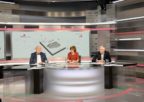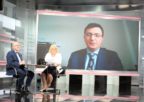On June 4th, 2020, an e-conference dedicated to the presentation of the “Report from the 1st “Health of Poles” 2019 Congress – summary and conclusions” was held online. The conference was hosted by Prof. Henryk Skarżyński, MD, Ph.D., dr. h.c. multi, initiator of the “Health of Poles” 2019 Congress and Jadwiga Kamińska, journalist and the President of the Journalists Club of Health Promotion Association.
Participants of the conference:
• Adam Niedzielski, DEconSc., President of the National Health Fund,
• Prof. Marek Krawczyk, MD, Ph.D., DSc., ordinary member of the Polish Academy of Science (PAN), Medical University of Warsaw (WUM), Department and Clinic of General, Transplant and Liver Surgery, former Rector of WUM,
• Grzegorz Juszczyk, MD, Ph.D., DSc., Director of the National Institute of Public Health, National Institute of Hygiene,
• Prof. Tomasz Zdrojewski, MD, Ph.D., DSc., Public Health Committee of PAN, Head of the Department of Hypertension and Diabetology of the Medical University of Gdańsk (GUMed),
• Prof. Krzysztof Opolski, Ph.D., DEconSc., Head of the Chair of Banking, Finance, and Accounting at the Faculty of Economic Sciences of the University of Warsaw,
• Justyna Wojteczek, journalist, editor-in-chief of the Health Service Portal of the Polish Press Agency (PAP),
• Krzysztof Jakubiak, journalist, chief editor of mZdrowie.pl. portal.
The conference was organized thanks to the support of PKN Orlen, the supporting partner of the “Health of Poles” 2019 Congress.
It is worth mentioning that during the 1st “Health of Poles” 2019 Congress there were 8 plenary debates and over 20 discussion panels. The Congress gathered representatives of ministries and government offices, leading scientists, experts in various fields of medicine, as well as economists, representatives of universities, media, and patients’ organizations – in total over 900 participants.
The Report presented during the e-conference contains conclusions from all discussions from the Congress. They are divided into the following topics: achievements and challenges of medicine, economics and health care, training of medical personnel, fostering health-oriented attitudes, and the role of research institutes in the health care system.
– The health of Poles, the health of each of us is the greatest capital now and the most important investment for the future – Prof. Henryk Skarżyński recalled an excerpt from the Congress’s motto when opening the e-conference – No one can be missing in the discussion about it – no generation, no community, no social group, no medium, no role model, no authority. Only then, rising to another level of our much-needed cooperation, as an example for our society, we can succeed.
The conference started with the topic of financing the health care system. – The new paradigm of thinking about the health of Poles and the health care system appreciates prevention, preventive medicine and the benefits of a healthy lifestyle to a greater extent – said Adam Niedzielski, DEconSc., President of the National Health Fund. – Before the pandemic, the National Health Fund was deeply involved not only in creating preventative programs but also in promoting pro-health attitudes. For example, the ‘No Sugar’ Campaign is worth mentioning. If it had not been for the pandemic, from the beginning of July we might have already introduced a sugar tax.
In the Report, Adam Niedzielski, DEconSc., also pointed out three critical areas in which the laws of economics directly affect the functioning of the health care sector: human capital, behavioral economics and management. Therefore, the alliance of these two seemingly separate worlds should provide significant added value, especially for patients.
– Today, we have many mechanisms that stabilize the financing of the health care sector. The first is a law guaranteeing an increase in expenditures to the level of 6% of GDP. Even if the revenues from the health insurance contributions are lower, reaching the statutory level is guaranteed by law. This may change the structure of financing the system: less from the contributions, but more from the budget subsidy. In addition, all activities related to the fight against COVID-19 were not funded from the contributions, but from the budget, so the funds for treatment have not decreased. The budget will also refinance all losses resulting from the waiver of the contribution, said Adam Niedzielski. He added that despite the protection system, health might be affected by the economic crisis resulting from the SARS-CoV-2 pandemic.
Professor Krzysztof Opolski, Ph.D., DEconSc., Head of the Chair of Banking, Finance, and Accounting at the Faculty of Economic Sciences of the University of Warsaw, also spoke about finances in health care.
– Today, however, it is difficult to talk about financing the system in isolation from current events, i.e., the SARS-CoV-2 pandemic. Freezing of planned admissions, huge costs of the fight against COVID-19 and the economic crisis on the horizon, all these raise the question: is there going to be enough money for health? It is worth asking this question because, as the President of the National Health Fund Adam Niedzielski pointed out, isolation brought about by the quarantine will have a negative impact on the health, including mental health, of Poles, said Prof. Opolski.
In the Report, Prof. Opolski stressed that citizens are willing to raise the healthcare insurance contribution to 11%, but they need to know what it will be spent on.
In connection with the SARS-CoV-2 pandemic, the importance of telemedicine in health care has grown rapidly. Internet communication tools have also become crucial for the education of future medical professionals, as all universities have switched to e-learning.
– The universities were already, to some extent, prepared for e-learning before the pandemic. Today we had to switch all the educational activities to the online method. In medicine, however, it is not possible to pass on and teach everything remotely. We also have to teach directly, said Prof. Marek Krawczyk MD, Ph.D., DSc, ordinary member of PAN, from the Department and Clinic of General, Transplant and Liver Surgery at the WUM, during the e-conference.
Professor Krawczyk also recalled the conclusions he reached together with other rectors of medical universities during the Congress, which are included in the Report: ‘Statistical data published by the European Union shows that Poland with 2.4 doctors per 1000 inhabitants placing at the end of the list of European countries. The percentage of family doctors in our country is dramatically low among all specialties, as it is only 9%, only Greece has less. So the question arises: how to improve these rates’.
At present, one of the most noticeable problems of the system is the lack of young doctors. – We appreciate the fact that medical faculties have been established at other universities, but the number of future doctors, nurses and pharmacists would certainly increase if the financial support for universities educating medical staff for years were to increase – said Prof. Krawczyk. As he added, more emphasis should also be put on the quality of education, transferring solid general medical knowledge and identifying future students with predispositions appropriate for medical professions. Prof. Krawczyk also reiterated Prof. Grodzicki’s suggestion that most of the practical classes should be taking place in the last year of medical studies. Although, this would require including in the education system, also non-university hospitals.
Professor Henryk Skarżyński also spoke many times about the advantages of telemedicine. – The current epidemiological situation in our country has resulted in the broadly understood telemedicine being almost instantly transformed from a technological innovation into an indispensable tool allowing for some kind of contact with the patient. The key to the success of this shift has undoubtedly become more comprehensive financing of e-procedures and e-advice by the National Health Fund. I am convinced that this change will be of great benefit to patients, even after the pandemic is over. For there is not and will not be such a health care system in the world, which – operating conventionally – will ensure equal access to specialists for each of us.
Prof. Tomasz Zdrojewski, MD, Ph.D., DSc., Public Health Committee of the Polish Academy of Sciences, head of the Department of Hypertension and Diabetology (GUMed), during the e-conference focused, among other things, on the life expectancy in modern societies. – In the years 2013/1014, the increase in the life expectancy of Poles came to a halt, even though we were still a long way behind Europe in this area. For example, Swedes live on average six years longer than us. This is alarming news. The key factors determining health and life expectancy are our lifestyle, followed by oncological and cardiological diseases, and then environmental factors, said Prof. Zdrojewski.
As two of the culprits of the ever shorter lifespan of Poles, Prof. Zdrojewski mentioned addictions (mainly alcohol and cigarettes) and obesity. He added that in the face of the upcoming collapse of the health level of Poles and the aging of the society, public health requires increased funding and modern policies. Similar data was also included in the Report by Prof. Zdrojewski: “the data on risk factors for non-communicable diseases in Poland is alarming. In health policy, there is an urgent need for strengthening prevention and public health.”
The topic of our quality of life was also present in the speech of Grzegorz Juszczyk, MD, Ph.D., DSc., Director of the National Institute of Public Health, National Institute of Hygiene, specialists of which are very much involved in the fight against the coronavirus pandemic. – I have repeated many times that patients with obesity, cardiovascular diseases, diabetes, kidney diseases have a much worse prognosis in the course of COVID-19 – this is a clear signal for the society to boost their immunity building, which, as Prof. Zdrojewski said, depends on our lifestyle.
Grzegorz Juszczyk, MD, Ph.D., DSc., also draws attention to this subject many times in his Report: “The most important postulate in the field of shaping health-promoting attitudes is to introduce a uniform model of education in public schools within the classes on knowledge about health or lessons about health conducted within other classes.”
Krzysztof Jakubiak, editor-in-chief of mZdrowie.pl, also participated in the e-conference. During the Congress, he was moderating a panel discussion on the effectiveness of NGOs in initiatives for the health of Poles. Both then and during the e-conference, Krzysztof Jakubiak emphasized the problems with the financing of these organizations, which significantly intensified during the pandemic. – According to the Report of the Institute for Patient Rights and Health Education, there are about a thousand organizations in our country actively working for the benefit of the patient. 73% of them are involved in the area of health promotion, prevention and education, 60% is involved in rehabilitation and therapy, 30% offer crisis interventions and psychological support, 29% support patients financially and logistically in buying medicines and medical equipment, added Jakubiak.
The conference ended with a speech by Justyna Wojteczek, editor of the PAP Health Service Portal, who participated in a panel discussion on the role of journalists in shaping health-promoting attitudes during the Congress. Once again, Justyna Wojteczek emphasized how important it is for the presented material to be not only reliable but, most of all, conveyed in a modern and effective way.
– We must continuously try to use new media and be an active participant in the social media space, because the youngest recipients use only that, emphasized Wojteczek, journalist – It is a perfect place for the development of journalism that promotes health-oriented activities. One of the biggest challenges of modern journalism in Poland and in the world is to provide information, in a reliable way, and in times of pandemics in a balanced way. It is not easy.
During the Congress, the invited journalists repeatedly stressed that they are keen to engage in actions promoting healthy lifestyles and inform about the advances in medicine. However, the problem is that in the age of the Internet, the traditional means of communication do not always bring the intended effect, and reliable information is often lost in a multitude of reports that fail to provide accurate and up-to-date medical knowledge.











